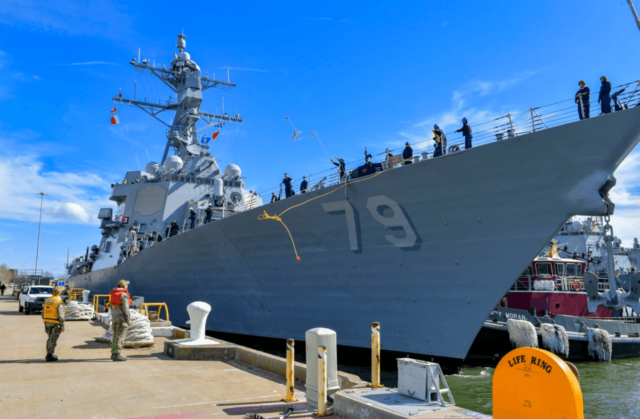
US Navy refuses to deploy warship over unvaccinated CO The Arleigh Burke-class guided-missile destroyer USS Oscar Austin (DDG 79), returns to port after completion of a successful four-day sea trials (U.S. Navy photo by Mass Communication Specialist 1st Class Jacob Milham/Released)
The U.S. Navy is refusing to deploy a destroyer while its commanding officer, who they cannot remove due to a court decision, is not vaccinated against COVID-19 despite the service’s vaccine mandate rules.
The unnamed destroyer captain is one of several service members involved in a lawsuit challenging the military-wide vaccine mandate and requesting they be granted religious exemptions to the mandate. Last month federal judge Steven D. Merryday granted the captain and a U.S. Marine officer a preliminary injunction, temporarily barring their respective services from taking any punitive action while their lawsuit continues. Unable to remove the captain, now the Navy is arguing that Merryday’s decision has sidelined the warship based out of Norfolk, Va.
Merryday’s injunction prevents the service from removing the destroyer commander from his post on the warship and replacing him. Until the lawsuit is ultimately resolved or the Navy allows the destroyer to deploy with its current commanding officer, the warship is stuck.
In a Feb. 28 filing, the Navy appeal requested Merryday overturn the injunction, in part, to allow the service to put a different commanding officer in charge of the destroyer.
Stars & Stripes reported that in one of its filings, the Navy said Merryday’s decision is “an extraordinary intrusion upon the inner workings of the military that presents a direct and imminent threat to national security during a global military crisis, and it indefinitely sidelines a Navy warship.”
The Navy further argued that the service is also seeking the warship commander’s removal due to loss of confidence in his leadership regarding COVID-19 precautions.
Capt. Frank Brandon, commodore of Destroyer Squadron 25 wrote, in support of the Navy’s appeal, that he had lost confidence in the warship commander after he attended a meeting with 50 to 60 other people, during which he “could barely speak” and had a sore throat and tested positive thereafter for COVID-19.
Brandon also accused the warship commander of lying on a leave request by indicating he planned to stay in the Norfolk area, when he had instead planned to travel to Florida to testify as part of the lawsuit against the Navy.
“I consider [the commander’s] failure to notify me that he was traveling out of area to be an egregious breach of trust,” Brandon wrote in his testimony. “I believe that [he] intentionally misled me. This is cause alone for removal.”
Brandon said, “If I cannot trust the commanding officer of a guided-missile destroyer to honestly apprise me of his whereabouts, I cannot trust him with command of the ship or [its] crew.”
In support of the Navy’s appeal, Vice Adm. Daniel Dwyer, the commander of 2nd Fleet, also wrote that the decision “requires the Navy to leave a subordinate commander in command of a warship despite his senior officer’s questions related to his fitness to discharge his duties as ordered.”
Liberty Counsel, the non-profit group working with the warship commander and other plaintiffs have called into question the Navy’s claims that the warship was unusable and could not risk deploying with an unvaccinated crew member. In a Tuesday press release, the group wrote, “At the time the DoD made this offensive argument, [the destroyer commander] was commanding his warfare surface ship far out at sea doing drills, training and testing the ship and its crew for mission readiness.”
In a March 2 response to the Navy, Merryday rejected their request to overturn the injunction and said the service was attempting “to evoke the frightening prospect of a dire national emergency resulting from allegedly reckless and unlawful overreaching by the district judge.”
Merryday has previously questioned the Navy’s claims that service members will be at increased risk if the service grants the plaintiffs’ requests for religious accommodations to the vaccine mandate, since the service has already granted some exemptions on medical and grounds. As of March 2, the Navy has granted 12 permanent medical exemptions, 211 temporary medical exemptions, 39 administrative exemptions and one religious accommodation for a member of the service’s Individual Ready Reserve (IRR).
In rejecting the Navy’s appeal to overturn his injunction, Merryday also referred to the warship commander as someone “who is triumphantly fit and slim and strong, who is robustly healthy, who is young, who has already caught and recovered from COVID-19 with only trivial symptoms” and “who has commanded the same destroyer ‘underway’ on a
300-day mission with a 320-sailor crew.”
The Department of Defense and the Navy have now requested that the U.S. Supreme Court get involved in the case.
The DoD and Navy told the Supreme Court that they “moved for a partial
stay” of Merryday’s injunction and “did not seek to stay the portion of the
injunction that protects respondents from discipline or discharge
for remaining unvaccinated.”
“Instead, the government sought a stay only insofar as the injunction ‘precludes the Navy from considering [respondents’] vaccination status in making deployment, assignment, and other operational decisions,’” the DoD and Navy told the Supreme Court.




